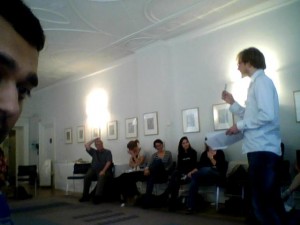Doug: The engineers have supplied to the business community a reason for reducing smoke in their own terms. But it doesn’t actually deal with the exploitive nature of those businesses. You shouldn’t reduce smoke just because it makes business sense.
Peter: The business case solution doesn’t provide a long-term solution. But we should ask ourselves if it works towards justice right now? It’s not a great long-term or complete solution, but it works towards that goal.
Jen: There’s a tension in the case of Rico between the community and the greater community of those who will be supplied with the electricity.
Donna: Energy deregulation in the US has caused many problems. You have deregulation without competition so energy is very expensive and controlled by monopolies.
Jen: Rico is not a wealth community so they could not run a energy coop like some other communities in Colorado.
Lily: I’m from Engineers against Poverty and we work to make the “business case” in the developing world because we think it’s important.
Arias: I’d love to see more of these histories but I think engineers sometimes concentrate too much on the technical fix and not enough in defining the problem.
Darko: I think we need to make the business case because they won’t change unless you force them to by showing that they can’t afford to.
Jon: I feel that one theme running in all these comments is the “triple bottom line” (social, environmental, economic). In some case studies, one or more of these factors are considered more than others.
Caroline: I think we’ve spent too much time thinking of the economic factor. We, as a community, need to be more worried about the social and environmental. Then maybe….maybe….we can talk about economics. We need to actually critique this economic factor much more. I want to smash the triple bottom line because it’s not easy equal categories. It’s more a muddle.

